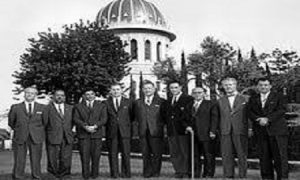Hossein Ali Nouri (Baha): “If the Baha’is become two cults and each builds a house of justice and opposes the other, both are invalid.”
Since 2008, the membership in the Universal House of Justice has been meaningfully related to the membership in the International House of Proselytizing of the Baha’is (based in Israel). Since the members of the House of Proselytizing are chosen by the Universal House of Justice, it turns out that there is a closed loop in which the members of the Universal House of Justice appoint their future candidates. This issue also indicates that the International House of Proselytizing acts as an election committee for future members of the Universal House of Justice. While an ordinary Baha’i never has a chance to be recognized and introduced and become a member of the Baha’i leadership foundation.
آنچه در ادامه می خوانید
The position of the Universal House of Justice among the Baha’is
According to Hossein Ali Nouri (Bahaullah), in every region in which there are a group of Baha’is, an assembly of the Universal House of Justice consisting of nine representatives for the affairs of the Baha’is should be formed:
“It is surely obligatory for every city to have a House of Justice consisting of 9 people, and there is no problem if the number is more.”
According to Abdul Baha’s commandments, two separate and complementary organizations must exist in the Baha’i legal system:
Legislation Organization and Explanation Organization
Legislation organization means legislative sources. The books of commandments of the Bab and Bahaullah contain many ambiguities and obscurities and require interpretation and explanation (such as the punishment of robbery, inheritance and the punishments of adultery, etc.).
After Shoghi Effendi’s death, the Universal House of Justice was considered as the last hope of the Baha’is to legislate the necessary laws. According to Baha’i texts, the Universal House of Justice is infallible and its commandments are binding. Abdul Baha writes:
“But the Universal House of Justice which is the source of all goodness and is also away from all error.”
The organization of interpretation. Those who have the right to interpret and explain the heavenly expressions in Baha’ism are: Abdul Baha and Shoghi Effendi. Abdul Baha clearly says in the Tablets of wills:
“O’ kind friends, after the loss of this oppressed person, the branch of the Blessed Tree and the disciples of God’s faith and the lovers of the Blessed Beauty should pay attention to the branches of the two Trees, which have been proven from two holy trees, and which have been created from the union of the two branches of an exuberant tree, that is, Shoqi Effendi because he is Allah’s sign and distinguished branch and etc.”…
Shoghi writes in Dowr-e-Baha’i book:
“This innovative discipline… is based on two firm pillars: The first and supreme pillar is the Divine Guardian, which is the source of explanation, and the second pillar is the Universal House of Justice, which is the source of legislation… because these two indissoluble institutions jointly carry out their duties, The affairs of the community will be managed and the measures of the society will be connected and the expediencies of God’s faith will be promoted… . The power, authority, rights and privileges of these two institutions are not contradictory to each other and do not reduce the importance of the other in any way… “
Shoghi Effendi’s infertility was an unexpected issue; because he himself had not predicted it; because he writes in the Dowr-e-Baha’i book:
“But the current affairs and the guardians of affairs in the future should fully testify to the truth of this important principle of our dear religion with their words and actions.”
Baha’is are proud of this issue that for the first time in the history of religions, the duty of the religious community has been well defined after the founder, while this importance issue, i.e. the infertility of the second leader after the founder has not been an insignificant matter be hidden by a divine and infallible person (according to Baha’is); i.e. Bahaullah who is the supreme manifestation of God on earth! How is it possible for a person to consider himself to be the perfect manifestation of God on earth and to be unable to prophesy one or two generations after his death for continuation of his religious law? How should it be accepted that the continuation of the Baha’i faith depends on the presence of male offspring of Baha’u’llah’s generation? But less than a hundred years after his death, there is no one among his generation to take over the responsibility of the governorship? It turns out that the dignitary of the Baha’is who considered himself to be the greatest manifestation of God on earth, had no knowledge of the future (that is, not distant future) and as a result, he was not connected to the source of divine knowledge at all.
Proof of the invalidity of the Baha’i House of Justice
Remey Baha’is (orthodox) are against the establishment of the House of Justice and opposed the current establishment of the House of Justice and believed in the guardianship of Mason Remey. He himself formed a temple and another leadership council parallel to the House of Justice in Haifa. The desire to form the Universal House of Justice parallel to Bahaullah’s fatwa means both of them are invalid. Bahaullah says:
“If the Baha’is become two cults and each one builds a house of justice and oppose each other, both are invalid.”






